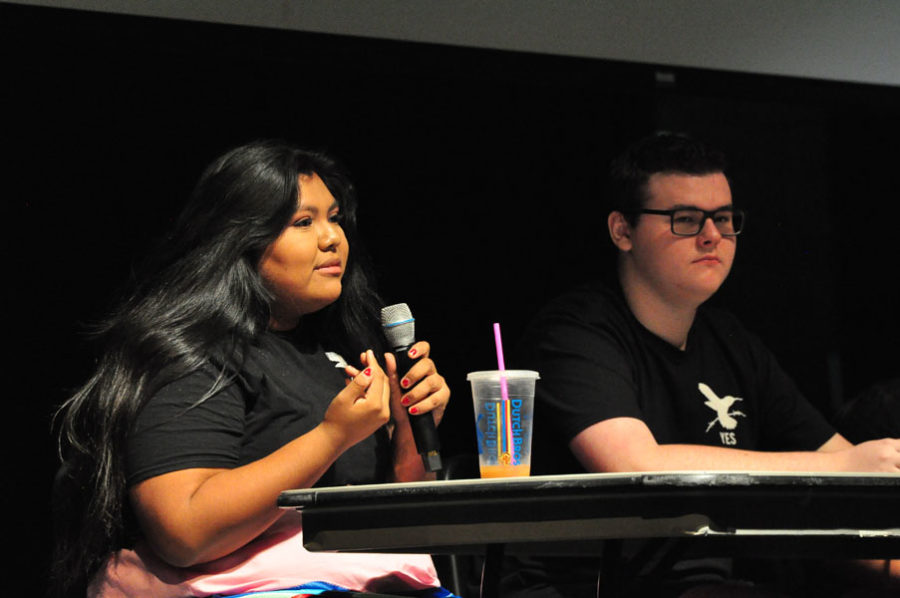Senior Sareya Taylor speaks on the student panel sponsored by the YES program for Perry faculty members at the October staff meeting. It was an opportunity for teachers to ask questions about equity in the classroom and get students’ responses.
Equity program’s aim is that “every student can be successful,” and is not political, district says
Are you legal?
Oh. You’re planning on going to college?
These kinds of questions are a common weekly occurrence for senior Sareya Taylor.
Taylor is Native American, and this story is not an unusual one.
Over the past two years, the Chandler Unified School District has been working to submerge itself into creating equitable learning environments for students in order to decrease the number of stories like Taylor’s. The district has specifically focused on this idea by adopting the Deep Equity program.
Equity, defined
Equity is defined as freedom from bias or favoritism. The program promotes impartiality in the classroom by reaching out to teachers. Governing board member Dave Evans explained that the district has “more impact on the staff… those educators… can then have the impact on helping improve behaviors and helping to create equitable environments.”
According to CUSD director of equity and inclusion, Dr. Adama Sallu, the policy has been designed to uphold the district’s standards of equity: Access, Achievement, Discipline, Graduation Rate, and Perception. Sallu continued to outline that the new policy is meant to maintain “our diverse population.”
Students take ownership
One aspect of this is cultivating student voice on campus. The Y.E.S. program, sponsored by photography teacher Megan Driving Hawk and math teacher Eric Rygiel, embodies this idea by uniting students of differing cultural backgrounds.
Senior Patricia Yango, who is an active member in the program, explained that “Equity is important, especially on campuses like Perry, because often times we are shielded to the reality of the world outside of what we are presented with.”
Y.E.S., which stands for Youth Equity Stewardship, is now present at all six Chandler high schools and at the Perry fall staff meeting in October, Y.E.S. sponsored and hosted a student panel for the faculty.
Teachers were given the opportunity to ask the students about ways to make their classrooms more equitable and the panelists shared personal situations in which they felt they were demeaned or discriminated against in the school setting.
District leaders see need for unity, face community criticism
The idea of equity is not a total random development. Multiple incidents have occurred across the district over the past couple of school years that have prompted the need for a new program.
Despite this, the policy has been met with both approval and criticism.
According to Evans, adversity has been voiced by parents and teachers cross campus.
Evans explained that “There is a group of people that insist this is wrong for public education,” because they may feel that it “takes away from teaching time and better academics.”
This group of community members have voiced their concerns at multiple board meetings, including the one on May 8 of this year.
The meeting minutes stated that “Several parents expressed concern…that [the Deep Equity program] promotes bullying, it is political harassment and that social/emotional issues in students actually increase.”
The flip side of these arguments are evident as well. Deep Equity may grow community awareness of cultural differences and improve students’ opportunities at an education, Yango said.
Yango credited equity and the new program to “expos[ing] us to other types of realities.” Inclusion on school campuses is vital to a harmonious environment, she said.
The question here is when does inclusion encroach on the original role of educators: to educate?
It is expensive; is it political?
Additional concern stems from the funding of the program. According to CUSD spokesman Terry Locke, Deep Equity is costing the district over $200 thousand every year, which is a price tag that has raised some eyebrows across the nation, especially to groups who claim Deep Equity is political.
“Educational equity is not a social or political platform or belief system,” Locke said. “It is a genuine focus on meeting the needs of diverse student population in a culturally competent environment.
“Our goal is to provide equitable educational opportunities for all students,” he said.
